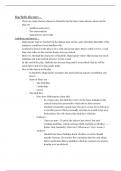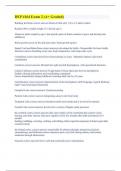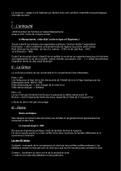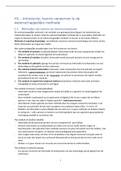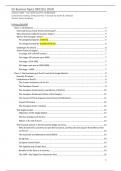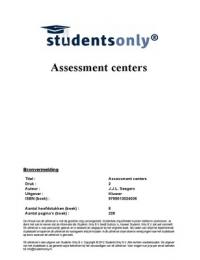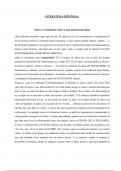Macbeth themes -
- There are many themes shown in Macbeth, but the three main themes shown in the
play are -
- Ambition and power
- The supernatural
- Appearances and reality
Ambition and power -
- Shakespeare had set Macbeth in the distant past and in a part of Britain that little of his
audience would have been familiar with
- Scotland is shown in the play to be a wild and savage place that is ruled over by a weak
king who relies on his warrior thanes to keep control
- However, through the character of Macbeth, Shakespeare shows that having too much
ambition and total control of power is just as bad
- By the end of the play, Malcolm has become king and it seems likely that he will be
much fairer and treat his people justly
- How is this shown in the play -
- In Macbeth, Shakespeare examines the good and bad aspects of ambition and
power
- Some of these are -
- The fatal flaw
- Leadership
- Greed
- The fatal flaw -
- How does Shakespeare show this -
- In a tragic play, the fatal flaw refers to the basic mistake in the
central characters personality which drives their actions
- Macbeth is basically a good man who goes wrong. He is driven by
a need for power which eventually sets him on a path to his own
destruction. His wife shares this fatal flaw with him
- Evidence -
- I have no spur / To prick the sides of my intent, but only /
Vaulting ambition, which o'erleaps itself And falls on th'other -- /
[Enter Lady Macbeth] / How now? What news? (Act 1 Scene 7)
- Analysis -
- Macbeth has been thinking about whether or not he should
murder Duncan. He reaches the conclusion that the only thing
that is motivating him is ambition which he compares to a horse
leaping over an obstacle
, - As for the horse and rider, what is on the other side of the
obstacle is unknown. It could be disaster.
- However, before Macbeth can complete the thought and turn
away from the crime, he is interrupted by Lady Macbeth
entering. Had she not appeared at this point, the outcome might
have been different
- Leadership -
- How does Shakespeare show this -
- In Macbeth, Shakespeare shows us three very different leaders
- Duncan is not a good king as although he is kind and generous,
he is weak
- Macbeth is strong but becomes a bullying dictator
- Malcolm seems to present a healthy balance and combines the
good qualities of both men
- Evidence -
- The king-becoming graces - / As justice, verity, temp'rance,
stableness, / Bounty, perseverance, mercy, lowliness, / Devotion,
patience, courage, fortitude - / I have no relish of them, but
abound / In the division of each several crime, / Acting it many
ways. (Act 4 Scene 3)
- Analysis -
- Malcolm lists the qualities of a good king or leader when he is
testing Macduff’s loyalty
- As part of the test, Malcolm pretends that he has none of these
qualities either,
- It is clear that Macbeth has none of these virtues, if anything, he
displays the absolute opposites. Even his courage, clearly
reported at the start of the play, has deserted him as he
terrorises and murders those around him
- Greed -
- How does Shakespeare show this -
- As part of Macbeth’s ambition he becomes greedy and selfish
- Macbeth cannot accept that Banquo’s descendants will become
kings after him and sets out to alter the prediction by having
Banquo and Fleance murdered
- He is even unprepared to share power with his wife as he puts
her to one side, making secretive decisions and apparently not
even caring when she dies
- There are many themes shown in Macbeth, but the three main themes shown in the
play are -
- Ambition and power
- The supernatural
- Appearances and reality
Ambition and power -
- Shakespeare had set Macbeth in the distant past and in a part of Britain that little of his
audience would have been familiar with
- Scotland is shown in the play to be a wild and savage place that is ruled over by a weak
king who relies on his warrior thanes to keep control
- However, through the character of Macbeth, Shakespeare shows that having too much
ambition and total control of power is just as bad
- By the end of the play, Malcolm has become king and it seems likely that he will be
much fairer and treat his people justly
- How is this shown in the play -
- In Macbeth, Shakespeare examines the good and bad aspects of ambition and
power
- Some of these are -
- The fatal flaw
- Leadership
- Greed
- The fatal flaw -
- How does Shakespeare show this -
- In a tragic play, the fatal flaw refers to the basic mistake in the
central characters personality which drives their actions
- Macbeth is basically a good man who goes wrong. He is driven by
a need for power which eventually sets him on a path to his own
destruction. His wife shares this fatal flaw with him
- Evidence -
- I have no spur / To prick the sides of my intent, but only /
Vaulting ambition, which o'erleaps itself And falls on th'other -- /
[Enter Lady Macbeth] / How now? What news? (Act 1 Scene 7)
- Analysis -
- Macbeth has been thinking about whether or not he should
murder Duncan. He reaches the conclusion that the only thing
that is motivating him is ambition which he compares to a horse
leaping over an obstacle
, - As for the horse and rider, what is on the other side of the
obstacle is unknown. It could be disaster.
- However, before Macbeth can complete the thought and turn
away from the crime, he is interrupted by Lady Macbeth
entering. Had she not appeared at this point, the outcome might
have been different
- Leadership -
- How does Shakespeare show this -
- In Macbeth, Shakespeare shows us three very different leaders
- Duncan is not a good king as although he is kind and generous,
he is weak
- Macbeth is strong but becomes a bullying dictator
- Malcolm seems to present a healthy balance and combines the
good qualities of both men
- Evidence -
- The king-becoming graces - / As justice, verity, temp'rance,
stableness, / Bounty, perseverance, mercy, lowliness, / Devotion,
patience, courage, fortitude - / I have no relish of them, but
abound / In the division of each several crime, / Acting it many
ways. (Act 4 Scene 3)
- Analysis -
- Malcolm lists the qualities of a good king or leader when he is
testing Macduff’s loyalty
- As part of the test, Malcolm pretends that he has none of these
qualities either,
- It is clear that Macbeth has none of these virtues, if anything, he
displays the absolute opposites. Even his courage, clearly
reported at the start of the play, has deserted him as he
terrorises and murders those around him
- Greed -
- How does Shakespeare show this -
- As part of Macbeth’s ambition he becomes greedy and selfish
- Macbeth cannot accept that Banquo’s descendants will become
kings after him and sets out to alter the prediction by having
Banquo and Fleance murdered
- He is even unprepared to share power with his wife as he puts
her to one side, making secretive decisions and apparently not
even caring when she dies

